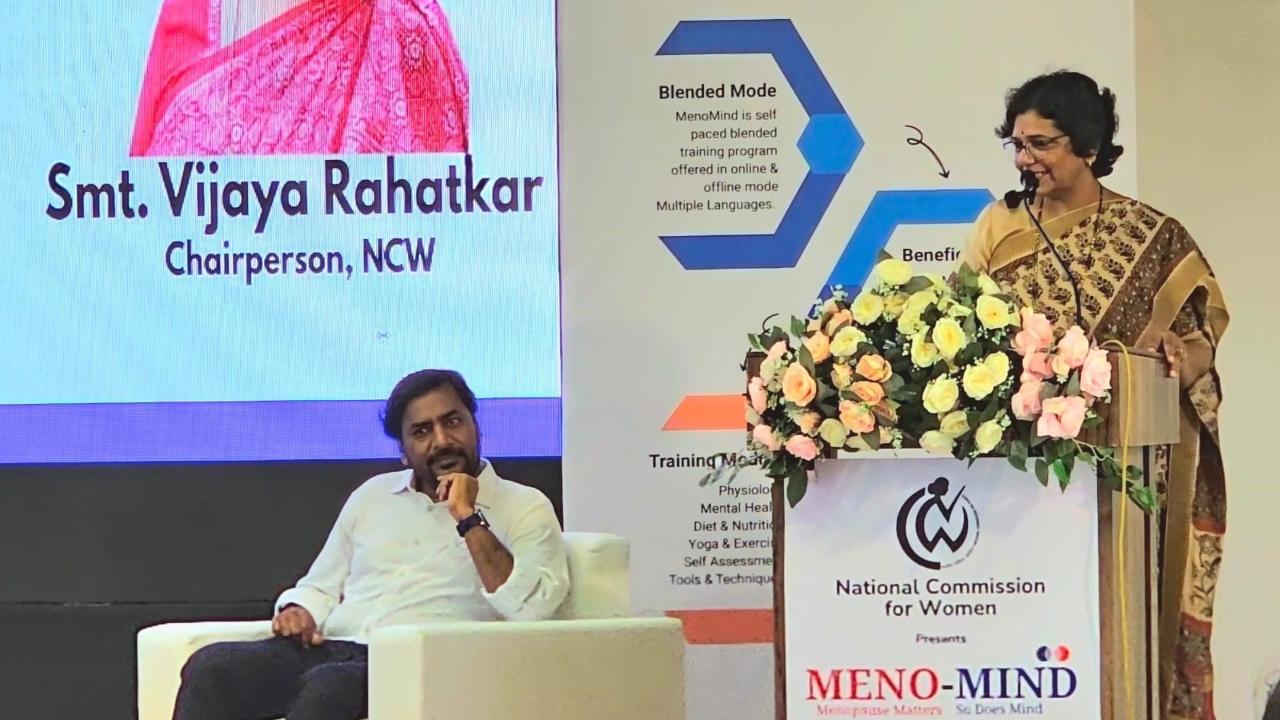The ‘MenoMind’ campaign — a joint initiative by the NCW and the Rising India Research Foundation, Pune — was formally launched in Pune on Wednesday evening, with Rahatkar officiating the ceremony

Dr Girish Lad and NCW chairperson Vijya Rahatkar
“Menopause is not merely a biological transition but also a psychological and social one. During this phase, women need strong support from their families and society at large. The declining age of menopause is a worrying concern,” said Vijaya Rahatkar, Chairperson of the National Commission for Women (NCW), at the launch of the ‘MenoMind’ initiative.
The ‘MenoMind’ campaign — a joint initiative by the NCW and the Rising India Research Foundation, Pune — was formally launched in Pune on Wednesday evening, with Rahatkar officiating the ceremony.
“The development of women cannot be achieved merely through legislation. It is only when women have access to good health that their true growth can take place. ‘MenoMind’ is a significant step in that direction,” Rahatkar said.
She emphasized the need to create awareness around menopause, encourage open conversations, and ensure the campaign’s message reaches women across the remotest parts of the country. She also called for policy-level reforms to integrate menopause awareness into government health strategies.
“The aim of this initiative is to reach ordinary women — especially those from middle-class and rural backgrounds — who often lack access to health education,” she said. “Although menopause is a deeply personal experience, women are still hesitant to speak openly about it. The same was once true for menstruation, but through persistent awareness efforts, open discussion is now more common. Menopause must also be brought into the mainstream dialogue.”
Rahatkar expressed concern over the decreasing age of menopause onset, calling it a serious health and social issue. “Women navigate multiple phases in life, overcome challenges, and achieve significant milestones. Just as they enter the prime of their lives, menopause can trigger self-doubt and lead to thoughts of giving up. Many women begin to feel like stopping midway. That’s why it is essential to support and guide them during this phase.”
She added, “At a time when women are managing family responsibilities and striving to fulfill their aspirations, hormonal changes during menopause can lead to feelings of despair. In such times, understanding and support from family, colleagues, and society is vital. Women need emotional, medical, and physical support to navigate this stage. This is why NCW has chosen to focus on this issue.”
Rahatkar further noted, “True gender equality will only be achieved when men begin to understand and empathize with the challenges women face, including those related to menopause.”
Dr. Girish Lad, Founder and Director of the Rising India Research Foundation, also addressed the gathering. “The primary concern behind this initiative is the rapidly declining age of menopause onset and the lack of mental and social preparedness to deal with it. What was once expected around ages 45–50 is now being seen as early as 35,” he said.
“Though menopause is a natural biological process, it remains a taboo subject. Women often experience loneliness, depression and question their identity — asking, ‘Has my womanhood ended?’ Unfortunately, most families are unaware of the emotional turmoil women go through during this time,” he added.
To address these challenges, the NCW and Rising India Research Foundation have launched a comprehensive multilingual campaign across both online and offline platforms. The initiative aims to reach 250–300 million Indian women who are in the menopausal or peri-menopausal stage.
Rather than conventional health seminars, the campaign will take the form of an emotionally resonant and engaging web series designed to be accessible and easy to understand. Additionally, a 50-hour “Train the Trainer” program will be introduced to equip individuals who can then spread awareness within their communities.
The NCW has appealed to all sections of society to support the mission by providing mental, emotional and social assistance to women during this critical phase of life.
 Subscribe today by clicking the link and stay updated with the latest news!" Click here!
Subscribe today by clicking the link and stay updated with the latest news!" Click here!










